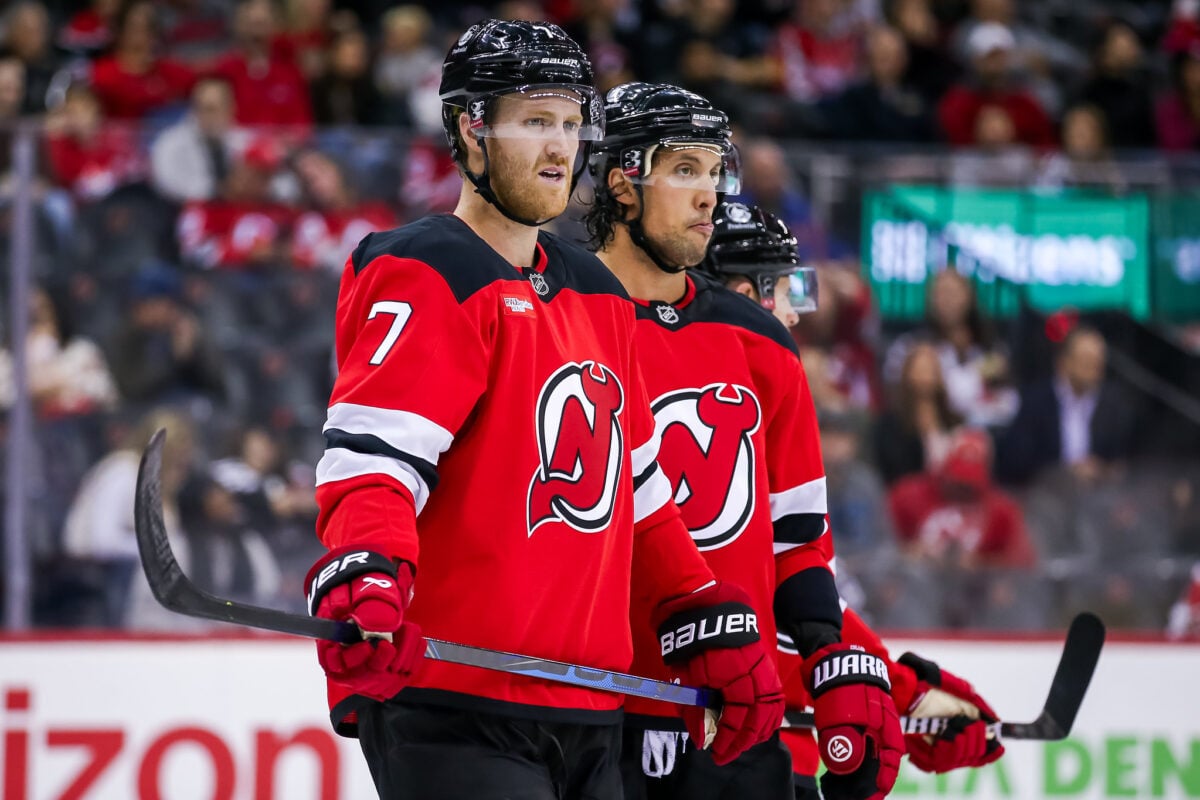When fans think about the New Jersey Devils, the first things that come to mind are speed, skill, and a young core headlined by Jack Hughes, Nico Hischier, Jesper Bratt, and Timo Meier. But as dangerous as the Devils are at even strength, their true ceiling in the 2025-26 season may ultimately come down to how they perform on special teams.
Last season, the Devils sat in top spots for both the power play (PP) and penalty kill (PK) during the regular season at 28.2% and 82.7%, respectively, but struggled immensely in the postseason. New Jersey went 0-15 on the man advantage and dropped to 68.4% on the penalty kill. Those shortcomings not only cost them valuable points but also were the main reason for the team’s first-round exit in the playoffs. If New Jersey wants to take the next step from contender to legitimate Stanley Cup threat, they must find a way to shake off the disastrous special teams postseason performance and work their way up to those league-leading numbers from the 2024-25 regular season.
The Devils’ Power Play
On paper, the Devils’ power play should strike fear into any opponent. Hughes’ vision and playmaking, Bratt’s precision passing, Meier’s net-front presence, and Dougie Hamilton’s laser from the point create a dream setup. But too often, despite overall positive numbers, the execution has been inconsistent, marred with hot stretches followed by prolonged droughts where zone entries stalled, puck movement slowed, and quality chances diminished.
Related: Devils’ Toughest Opponents in 2025-26
Injuries have repeatedly disrupted the Devils’ lineup, forcing constant changes to their special teams units. Still, they need to find a way to maintain structure on the man advantage, even when key players are missing. One bright spot has been Jack Hughes, whose presence has become instrumental on the penalty kill. Under the guidance of former coach Lindy Ruff, Hughes was solely utilized on the power play, rarely seeing time on the penalty kill. However, with Sheldon Keefe now leading the team, Hughes has become a regular on the PK, showcasing the growth and maturity in his overall game.
Obviously, Hughes being out of the lineup in the postseason was detrimental for the team on both the PP and PK, and the Devils were unable to figure out a way to maintain their high-performing numbers without their star forward in the lineup. As the 2025-26 season looms, the Devils have a mostly healthy roster and will need to find a new structure and approach to erase the memories from this past April and develop more consistency on the man advantage.
The Devils’ Penalty Kill
The power play may have been inconsistent, but the penalty kill faltered when it mattered most. Although their numbers were solid, New Jersey often faced stretches with an inability to clear the puck, win key faceoffs, or protect the slot, frequently leaving goaltenders facing high-danger chances. Opponents quickly learned that drawing penalties against the Devils was almost as effective as scoring one themselves. With new assistant coach Brad Shaw replacing Ryan McGil to run the defense and penalty kill, hopefully, some of these negative trends can be prevented altogether.

New additions like Connor Brown and Evgenii Dadonov should close gaps the Devils were desperately needing in their bottom-six core, and the two of them will undoubtedly be slotting into the second unit for the penalty kill. Additionally, the recent extension of Cody Glass could prove to be beneficial, as his short time in New Jersey has been impactful for both even-strength play and special teams. Glass has asserted himself as an underrated key player for the Devils, and I would not be surprised to see him get more ice time on the PK.
Why Special Teams Is Crucial for the Devils
The margin between winning and losing in today’s NHL is razor-thin. A single power-play goal or timely penalty kill can swing momentum and alter outcomes in ways that five-on-five play alone cannot. For a team like the Devils, loaded with talent but still chasing consistency, special teams are all the difference between the tightly contested Metropolitan Division.
The Devils don’t need perfection with special teams — they need progress. With the firepower to build a top-tier power play and the personnel to sustain their penalty kill, the tools are certainly there. But execution and commitment will determine whether these improvements materialize on the ice for the Devils.
